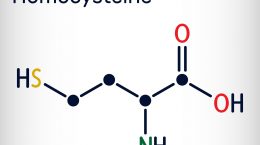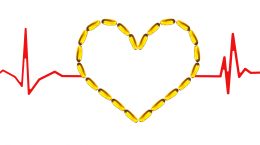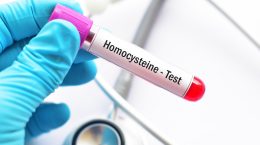Published on September 25, 2024
There is a reason why we don’t just talk about the benefits of omega-3, or encourage people to only focus on vitamin D – many of these nutrients work synergistically and are all needed to work together to maximise the reduction in dementia risk.
Key Points
- A recent study looked at three blood tests – homocysteine, vitamin D and omega-3 index – and assigned a score of 1 = bad or 0 = good to each result; a person scoring 3 (three ‘bad’ results) had 4.6 times the risk of having dementia compared to a score of 0 (three ‘good’ results)
- In this study, which is the third of its kind, if homocysteine was above 8mcmol/l, that was ‘high risk’ (scoring 1) and if below this, ‘low risk’ (scoring 0). Similarly, if vitamin D was below 15 ng/ml (37.5 nmol/l) that was classified as high risk and if the omega-3 index was below 5%, then that was classified as high risk.
- Homocysteine-lowering B vitamins slowed the rate of brain shrinkage by 73%; they also slowed the rate of cognitive decline, arresting it in a third of trial participants
 written by Patrick Holford
written by Patrick Holford
A few months ago, a study looked at three blood tests – homocysteine, vitamin D and omega-3 index – and assigned a score of 1 = bad or 0 = good to each result. A person scoring 3 (three ‘bad’ results) had 4.6 times the risk of having dementia compared to a score of 0 (three ‘good’ results). This confirms the synergistic effect of two of our four ‘biological horsemen of the mental health apocalypse’ – brain fats (omega-3 and vitamin D) together with homocysteine-lowering B vitamins.
The researchers, led by Dr Annike van Soest in Holland say:
“The effect size we observed was substantial; a four-fold increased risk of developing dementia in individuals with combined suboptimal status of omega-3, vitamin D, and homocysteine (three ‘bad’ results). This effect size is large in comparison with other risk factors of dementia. In our sample, being a current smoker or having diabetes doubled the risk, and being a carrier of at least one APOE ε4 allele (gene variant) tripled the risk of dementia (1).”
In this study, which is the third of its kind, if homocysteine was above 8mcmol/l, that was ‘high risk’ (scoring 1) and if below this, ‘low risk’ (scoring 0). Similarly, if vitamin D was below 15 ng/ml (37.5 nmol/l) that was classified as high risk and if the omega-3 index was below 5%, then that was classified as high risk.
Interestingly, this was based on the research of risk according to blood levels. So, while it is already known that if homocysteine is above 11mcmol/l the brain is shrinking at an accelerated rate, in this study, even levels above 8 are associated with increased risk of dementia!
At Food for the Brain, the optimal level for homocysteine is set at 7 or less.
Buy Your at-home Homocysteine Test from Food for the Brain Here
According to Professor David Smith from Oxford University whose group carried out the original study of this kind, homocysteine-lowering B vitamins slowed the rate of brain shrinkage by 73%. They also slowed the rate of cognitive decline, arresting it in a third of trial participants.
He stated:
“For too long nutrition has been relatively discounted as a factor in the causation of dementia. This study corrects that misconception and lays the foundation for prevention based upon multiple nutrients.”
A study in France (2), which didn’t include homocysteine but did include a measure of carotenoids as an indicator of ‘oxidation’ reported a fourfold increased risk if all blood tests were in the ‘high-risk’ category.
Food for the Brain offers a similar range of tests in their Dementia Risk Index functional Test (DRIfT) but with more sensitivity, plus adding in HbA1c as a measure of blood sugar resilience. They have also recently added a Glutathione Index test as a measure of antioxidant status (more coming soon).
In other words, they are looking at ‘four horsemen of the mental health apocalypse’, not just two. Additionally, instead of only having a good/bad, 0/1 scale they have a four-point scale, from 0 to 3 for each test. So, their 4 in 1 test can score within a range of 0 to 12.
(Read more about the 4 horsemen of the mental health apocalypse here)
On a practical level, your goal is to have all blood test levels in ‘the green’ zone, which they have set as:
- homocysteine below 7
- omega-3 index above 8%
- vitamin D above 40 ng/ml or 100 nmol/l
- HBA1c below 5.5%
- Glutathione Index above 500.
Tracking changes in these markers against changes in cognitive function would provide further evidence for a systems-based approach to preventing age-related cognitive decline. Whilst it might sound technical, when you test with us or Food for the Brain (you can enter your GrassrootsHealth results and support the research of both organizations in the process), we help by making it clear and easy to understand.
Food for the Brain hopes to have substantial test results soon, and to plug into NHS patient data to import more test results for vitamin D and HbA1c, along with future dementia diagnoses. This will help further develop and research the perfect DRIfT score and enhance their guidance for your future protection against cognitive decline.
Exciting, isn’t it?
Measure Your Vitamin D, Omega-3 Index, and HbA1c Levels as Part of the D*action Study
(You can enter your GrassrootsHealth results into their system)
Home Blood Spot Testing for Homocysteine Now Available (Glutathione Coming Soon!)
These tests are offered through Food for the Brain (FFB), another charity and friend of GrassrootsHealth, for a price of $80.19 for the homocysteine (or subscribe and save up to 6%; GrassrootsHealth discounts do not apply to this test) and $92.29 for the glutathione index (coming soon). While GrassrootsHealth is considering adding these tests to our study, we wanted to offer you the opportunity to test through FFB first and give us your feedback.
Buy Your at-home Homocysteine Test from Food for the Brain Here
PLEASE NOTE These tests require a fasted blood sample. It is suggested that you perform the test first thing in the morning after 12 hours of fasting, i.e. no food or drinks. For more information read Food for the Brain’s FAQs here. Email [email protected] with any questions you have about the test.
References
1. van Soest APM, de Groot LCPGM, Witkamp RF, van Lent DM, Seshadri S, van de Rest O. Concurrent nutrient deficiencies are associated with dementia incidence. Alzheimers Dement. 2024 Jun 12. doi: 10.1002/alz.13884. Epub ahead of print. PMID: 38865433.
2. Neuffer J, Gourru M, Thomas A, Lefèvre-Arbogast S, Foubert-Samier A, Helmer C, Delcourt C, Féart C, Samieri C. A Biological Index to Screen Multi-Micronutrient Deficiencies Associated with the Risk to Develop Dementia in Older Persons from the Community. J Alzheimers Dis. 2022;85(1):331-342. doi: 10.3233/JAD-215011. PMID: 34806604.
Make Sure You Are Getting Enough Vitamin D, as well as Omega-3s and Magnesium!
 Having and maintaining healthy vitamin D levels and other nutrient levels can help improve your health now and for your future. Choose which additional nutrients to measure, such as your omega-3s and essential minerals including magnesium and zinc, by creating your custom home test kit today. Take steps to improve the status of each of these measurements to benefit your overall health. With measurement you can then determine how much is needed and steps to achieve your goals. You can also track your own intakes, symptoms and results to see what works best for YOU.
Having and maintaining healthy vitamin D levels and other nutrient levels can help improve your health now and for your future. Choose which additional nutrients to measure, such as your omega-3s and essential minerals including magnesium and zinc, by creating your custom home test kit today. Take steps to improve the status of each of these measurements to benefit your overall health. With measurement you can then determine how much is needed and steps to achieve your goals. You can also track your own intakes, symptoms and results to see what works best for YOU.
Enroll in D*action and Test Your Levels Today!





